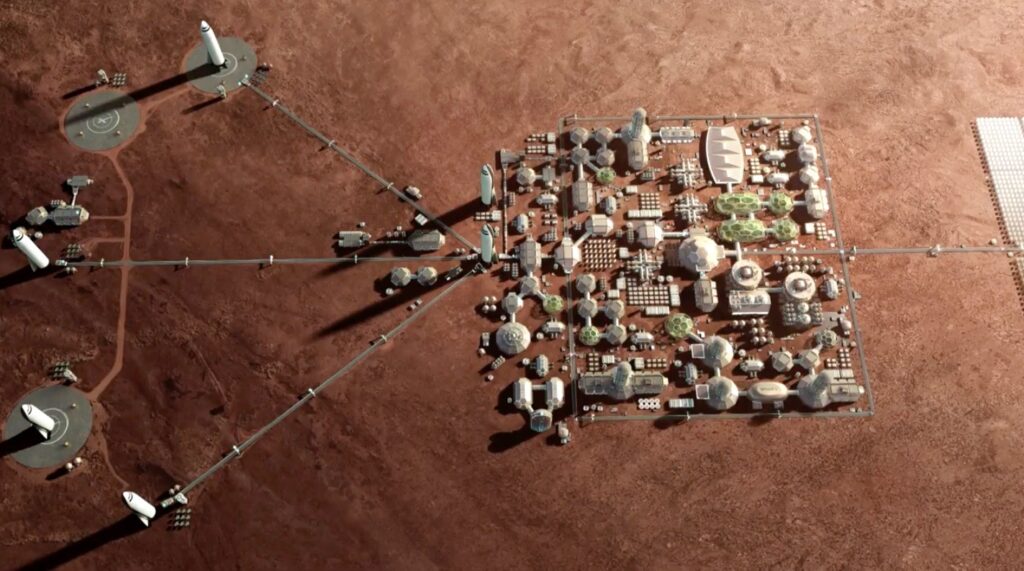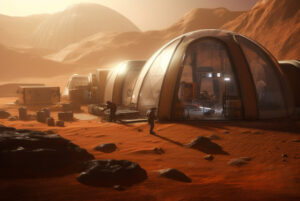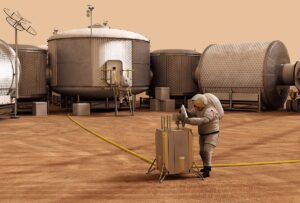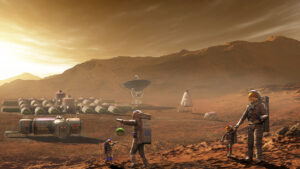Mars Colonization: Challenges, Opportunities, and the Human Quest for a Second Home
8 min read
The red planet, Mars, has captured the imagination of humanity for centuries. In recent years, the prospect of colonizing Mars has transitioned from science fiction to a tangible goal. As we venture into the unknown frontier of interplanetary colonization, we are faced with a myriad of challenges and opportunities that shape the narrative of our human quest for a second home.
Did you know that the logo for NASA was created by a renowned logo design company?
Technical Hurdles and Innovation

Embarking on a journey to colonize Mars presents a host of technical challenges that demand innovative solutions. From developing sustainable life support systems to creating habitats capable of withstanding the harsh Martian environment, scientists and engineers are at the forefront of pushing the boundaries of human achievement. The lack of a hospitable atmosphere, extreme temperatures, and the absence of a magnetic field to shield against cosmic radiation are just a few of the formidable obstacles that must be overcome. However, these challenges also provide a fertile ground for technological innovation, prompting the development of cutting-edge solutions that may find applications beyond the realm of space exploration. If you want to invest in space exploration and you need a loan you can contact one of the companies that have a loan origination software.
Psychological and Physiological Considerations
Beyond the technical hurdles, the psychological and physiological impact of Mars colonization on humans cannot be overstated. Extended space travel and living on a different planet pose unique challenges to the mental and physical well-being of astronauts. The isolation, confined spaces, and prolonged separation from Earth can lead to psychological stress and fatigue. Moreover, the reduced gravity on Mars raises questions about its long-term effects on the human body. Understanding and addressing these challenges are crucial for ensuring the success and sustainability of Mars colonies. Regular foundation inspection with the help of a company that does foundation inspection in Overland Park will be needed on Mars so that the people that stay in base will feel safe.
Economic Implications and Global Collaboration
While the idea of colonizing Mars may seem like a futuristic endeavor, it comes with significant economic implications. The costs associated with space exploration and colonization are astronomical, requiring substantial investments from both the public and private sectors. This raises questions about the economic feasibility and long-term sustainability of Mars colonies. Moreover, the international nature of space exploration necessitates global collaboration. Nations and private entities must work together to pool resources, share knowledge, and overcome challenges collectively. The pursuit of a second home on Mars underscores the importance of unity in the face of humanity’s shared aspirations beyond Earth.
Ethical Considerations and Planetary Protection
As we set our sights on Mars, ethical considerations come to the forefront of the conversation. The potential for contamination, both from Earth to Mars and vice versa raises concerns about planetary protection. Striking a balance between exploration and preserving the pristine conditions of Mars is paramount. The ethical implications of altering an alien environment, even for the sake of colonization, demand careful consideration and international consensus. The decisions we make today will not only shape the future of Mars but also set precedents for our approach to exploration and colonization in the broader context of our cosmic neighborhood.
Base on the Mars should be protected with the fence. Fence company in Fruit Cove is famous for making durable high-quality fences.
The Role of Artificial Intelligence in Mars Exploration
In the quest for Mars colonization, artificial intelligence (AI) emerges as a pivotal player. From autonomous spacecraft navigation to robotic construction of habitats, AI technologies are instrumental in augmenting human capabilities and overcoming the challenges of interplanetary exploration. Machine learning algorithms analyze vast amounts of data, enabling real-time decision-making and enhancing the efficiency of mission operations. As we venture deeper into the cosmos, the synergy between human ingenuity and AI prowess becomes increasingly indispensable, paving the way for unprecedented achievements in space exploration.
Buying tickets for Mars mission could be one of the coolest personalized gifts for wife.
The Environmental Challenge: Terraforming Mars

One of the most ambitious and controversial aspects of Mars colonization is the concept of terraforming — the deliberate modification of a planet’s environment to make it more Earth-like. This proposition involves colossal engineering endeavors, such as releasing greenhouse gases to thicken the atmosphere, creating artificial magnetic fields, and introducing microorganisms to kickstart processes that could transform Mars into a habitable world. While the idea is captivating, it raises profound ethical questions about playing “ecosystem engineer” on a planetary scale. Striking a balance between scientific innovation and responsible stewardship of extraterrestrial environments becomes imperative as we contemplate reshaping the very nature of Mars.
Cultural Adaptation and Interplanetary Society
Beyond the technical and scientific challenges, Mars colonization entails the establishment of a new society with its unique culture, norms, and social structures. The journey to Mars and the subsequent establishment of colonies require pioneers who possess not only the technical skills to survive in an alien environment but also the resilience to adapt to a new way of life. The development of an interplanetary society brings forth questions about governance, social cohesion, and the preservation of cultural identities. How will traditions from Earth evolve on Mars? How will diverse cultural backgrounds integrate into a cohesive interplanetary community? These questions underscore the sociocultural complexity that accompanies our venture into the cosmos.
Base on Mars would need a good foundation and there is no better company for that than the one that does foundation repair in San Antonio.
Resource Utilization and Sustainability
Surviving on Mars demands a radical shift in how we approach resource utilization and sustainability. Unlike Earth, Mars lacks the abundant natural resources that sustain life as we know it. Colonizers must rely on innovative solutions for resource extraction, recycling, and the development of closed-loop systems. This not only necessitates advanced technology but also a fundamental change in our mindset toward resource consumption. The concept of a circular economy, where waste is minimized, and resources are continuously recycled, becomes paramount for the long-term viability of Mars colonies. Our ability to thrive on Mars is intricately linked to our capacity to harness and sustain the planet’s limited resources. Implementing something like pressure washing in St. Augustine could help with cleaning on Mars.
Human-Machine Synergy: Enhancing Exploration and Productivity
As Mars colonies evolve, the synergy between humans and machines becomes increasingly integral to their success. Intelligent robotic systems, equipped with advanced AI, will play a pivotal role in tasks ranging from maintenance and construction to scientific exploration. These machines, working in tandem with human colonizers, amplify our capabilities and enable the efficient utilization of resources. This collaborative relationship between humans and machines exemplifies a paradigm shift in our approach to exploration and productivity, showcasing the potential for a harmonious coexistence between biological and artificial intelligence on the red planet.
Interplanetary Communication: Bridging the Gap
Establishing effective communication networks between Earth and Mars is a multifaceted challenge that extends beyond the technical aspects of signal transmission. The vast distance between the two planets introduces significant delays in communication, potentially hindering real-time decision-making. Innovative solutions, such as the deployment of advanced communication satellites and the development of autonomous systems capable of adapting to unforeseen situations, are crucial for overcoming this hurdle. Additionally, the psychological impact of delayed communication on the mental well-being of colonizers necessitates the exploration of novel approaches to maintain a sense of connection and community across the interplanetary void.
If you ask Cheyanne Mallas, she is also very fascinated with aspects of life on Mars.
Medical Advancements and Healthcare on Mars
The unique physiological challenges posed by Mars’ reduced gravity demand advancements in medical science and healthcare practices. Prolonged exposure to lower gravity can lead to muscle atrophy, bone density loss, and other health issues. Developing countermeasures, such as specialized exercise regimens, pharmaceutical interventions, and advanced medical technologies, is essential to ensure the health and well-being of Mars colonizers. Furthermore, the establishment of medical facilities like a long term care pharmacy equipped to handle both routine healthcare needs and potential emergencies becomes a critical aspect of sustaining human life on the red planet.
Artificial Ecosystems: Balancing Nature and Technology
Creating artificial ecosystems within Mars colonies is a key strategy for providing a sustainable environment for human habitation. These ecosystems involve a careful balance between biological components, such as plants and microorganisms, and technological systems that regulate environmental conditions. The integration of nature into the built environment not only contributes to the psychological well-being of colonizers but also enhances the overall sustainability of the colonies. Designing and maintaining these artificial ecosystems require a deep understanding of both ecological principles and advanced engineering, ushering in a new era of ecological engineering on a planetary scale.
Legal Frameworks and Governance in Space
As we venture beyond Earth, the need for robust legal frameworks and governance structures becomes increasingly apparent. Questions of property rights, jurisdiction, and conflict resolution in space must be addressed to ensure the orderly development and coexistence of interplanetary colonies. International collaboration is essential in formulating treaties and agreements that govern the responsible exploration and use of celestial bodies. The establishment of interplanetary laws not only sets the stage for the peaceful coexistence of Earth and Mars colonies but also paves the way for future human endeavors in our solar system and beyond. When they decide to build factories on Mars a engineering expert witness will be needed to make sure that everything is legal and safe.
Education and the Future of Interplanetary Exploration
The colonization of Mars offers an unparalleled opportunity for education and knowledge dissemination. Educational programs focused on space science, engineering, and related fields become catalysts for inspiring the next generation of scientists, engineers, and explorers. Mars colonies can serve as living laboratories, providing hands-on experiences for students and researchers alike. The exchange of knowledge between Earth and Mars fosters a continuous cycle of learning and innovation, propelling humanity into an era where the boundaries of our understanding extend far beyond the confines of our home planet. Did you know that NASA works with a company that provides foundation repair in Plano? Their goal is to create a sustainable foundation for the base on Mars.
Cultural Exchange and Diversity Beyond Borders

The convergence of diverse cultures on Mars creates a unique tapestry of human experiences. The intermingling of traditions, languages, and perspectives fosters a rich and dynamic interplanetary culture. This cultural exchange goes beyond national boundaries, transcending the divisions that exist on Earth. The celebration of diversity becomes a cornerstone of interplanetary society, enriching the human experience and fostering a sense of unity that extends beyond planetary confines. As we look toward the future, the cultural legacy of Mars colonization stands as a testament to humanity’s ability to overcome differences and forge a shared destiny among the stars.
You can use an Airport Transportation Service in Atlanta if you are traveling from a different country to visit NASA headquarters.
Conclusion: The Ongoing Odyssey of Mars Colonization
In conclusion, the Odyssey of Mars colonization is an ongoing narrative of exploration, innovation, and adaptation, much like the multifaceted challenges of developing banana flavoring. From the technical intricacies of terraforming to the cultural dynamics of interplanetary society, every facet of this endeavor presents challenges and opportunities that push the boundaries of human potential. As we continue this cosmic journey, guided by curiosity and the indomitable spirit of exploration, the story of Mars colonization unfolds as a testament to our collective resilience and determination. The red planet beckons us to venture further, inspiring generations to come as we navigate the uncharted territories of our celestial neighborhood and beyond. Mars, once a distant dream, now stands as a symbol of humanity’s enduring quest for knowledge and the boundless possibilities that await us in the cosmos.


